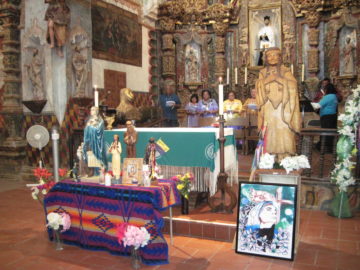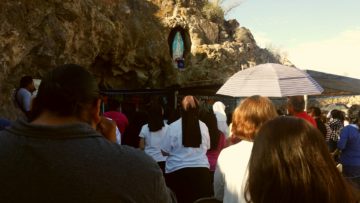As we contemplate the beauty of culture and traditions throughout the world on this Twenty-first Sunday of Ordinary Time, Fr. Paul Gallagher, OFM writes with a Franciscan perspective for your prayer. The reflection and questions are edited by Franciscan Sister of Christian Charity Sister Anne Marie Lom and Joe Thiel. The excerpts from the Sunday readings are prepared by Joe Thiel. To read or download the complete pdf with excerpts for your prayer, please click here: Franciscan Gospel Reflections August 9 2020. Excerpts are from the Lectionary for Mass for Use in the Dioceses of the United States of America, second typical edition © 2001, 1998, 1997, 1986, 1970 Confraternity of Christian Doctrine, Inc., Washington, DC. Used with permission. All rights reserved. No portion of this text may be reproduced by any means without permission in writing from the copyright owner. (Photos: San Xavier Mission, Tucson, Arizona)
Matthew 16:13-20
When Jesus went into the region of Caesarea Philippi he asked his disciples, “Who do people say that the Son of Man is?” They replied, “Some say John the Baptist, others Elijah, still others Jeremiah or one of the prophets.” He said to them, “But who do you say that I am?” Simon Peter said in reply, “You are the Messiah, the Son of the living God.”
Jesus said to him in reply, “Blessed are you, Simon son of Jonah. For flesh and blood has not revealed this to you, but my heavenly Father. And so I say to you, you are Peter, and upon this rock I will build my church, and the gates of the netherworld shall not prevail against it. I will give you the keys to the kingdom of heaven. Whatever you bind on earth shall be bound in heaven; and whatever you loose on earth shall be loosed in heaven.” Then he strictly ordered his disciples to tell no one that he was the Messiah.
Background:
The gospel from last week described Jesus’ encounter with a Canaanite woman in the pagan region of Tyre and Sidon. Following that exchange, Matthew reports that Jesus returned to the Jewish region and the shores of the Sea of Galilee. As we follow Matthew’s narrative from that point, great numbers of people follow Jesus into the mountains, where he cured many. After the crowd has been with them for three days, Jesus once again tells the disciples to give them something to eat. They have only seven loaves and a few fish. Jesus has the crowd recline on the grass, and he blesses the bread and has the disciples distribute it to the crowd. Then he has them collect what is left – seven baskets full of leftovers are collected. When the crowd is dismissed, Jesus and the disciples get into a boat and make their way to the district of Magadan where he encounters Pharisees and Sadducees. They ask him to produce some sign from heaven. Jesus leaves them without responding to their request. When they get to the other side of the sea, Jesus tells the disciples to be aware of the leaven of the Sadducees and Pharisees. The disciples have forgotten to bring bread for the trip, and they seem to presume Jesus is talking about the leaven for bread. Jesus makes it clear that he is speaking of the leaven of the Sadducees and Pharisees’ teaching. All this leads to the Gospel text for this week.
Like this week’s text from Matthew, Mark’s gospel also recounts an occasion when Jesus asks the same questions that are posed here. (Mark 8:27-29) In Mark’s account, Peter confesses that Jesus is the Messiah, but not that he is the “Son of the Living God.” Also, Jesus does not comment on Peter’s profession of faith, but he tells the disciples not to speak to others of what they have heard. Then Jesus speaks to them for the first time of his passion and death. Peter, hearing this for the first time, responds by taking Jesus aside and voicing objection to what Jesus is saying. Jesus replies by telling Peter to “Get behind me Satan, you are not thinking as God does, but as human beings do.” (Mark 8:33b) Mark’s account is powerful, but the reader will benefit from keeping the two accounts separate. Matthew’s account, the gospel text for today, represents a very different perspective into Jesus’ ministry and its invitation for our response.
As the reader reflects on this gospel, it will be helpful to be aware that people from Mediterranean cultures have a very different sense of themselves than most westerners. They are “other”-orientated to the extent that they may not have a sense of who they are apart from their family or clan. From this perspective, Jesus is not quizzing his disciples to see if they know his true identity. His questions are an effort to sort out for himself who he is. This way of thinking is very different than what many are accustomed to. There are examples of this mindset throughout the gospels. In John’s gospel, those who question Jesus are satisfied to learn that he is from Nazareth. Nathanael represents their attitude when he asks, “Can anything good come form Nazareth?” (John 1:46) In Mathew and in Mark, Jesus is identified as the son of a craftsman. (Matthew 13:55 and Mark 6:3) Lastly, the gospels portray an attitude that if you know one’s family, you know the person. “Is not his mother called Mary? And are not his brothers James and John and Simon and Judas? And are not all his sisters with us? Where then did this man get all this? And they took offense at Jesus.” (Matthew 13:55-57)
Hopefully, these passages help to highlight a different kind of understanding that people of Jesus’ day perceived of themselves and their identity. The more appreciation we gain of the culture in which the gospels were written, the deeper the insight for ourselves and our culture.
Reflection Questions:
- Can you call to mind recent experiences that reflect your independence?
- Can you also recall recent experiences that reminded you that you are dependent on others?
- How did you feel during both of those experiences?
- Have you ever had to go against the wishes of family or friends to pursue your goals?
- Has there been a period when you were searching for direction or even discovered you were not happy with the direction your life was heading?
- When you hear Jesus ask the disciples who people are saying that he is, what thoughts or feelings arise within you?
- What do you think Peter felt when he heard Jesus say: “Blessed are you, Simon son of Jonah. For flesh and blood has not revealed this to you, but my heavenly Father. And so I say to you, you are Peter, and upon this rock I will build my church, and the gates of the netherworld shall not prevail against it. I will give you the keys to the kingdom of heaven. Whatever you bind on earth shall be bound in heaven; and whatever you loose on earth shall be loosed in heaven”?
- Can you take time now to talk with God about how you see God working in the world today, or even your own life? What questions would you like to ask? Are their questions God might like to ask you?





Article Comments:
Karen Phillips 08/21/2020 @ 4:28 pm
I feel God working in my life every day. I am a completely different and better person since becoming Catholic two and a half years ago. I was raised Lutheran and anti Catholic by my mother but God sent me some very special people from the Quad parish in Green Bay including a special Sister from your order that helped me through my conversion. It was a struggle for me but I have no regrets. I try my best to follow the Holy Spirit’s direction and live a Franciscan lifestyle.